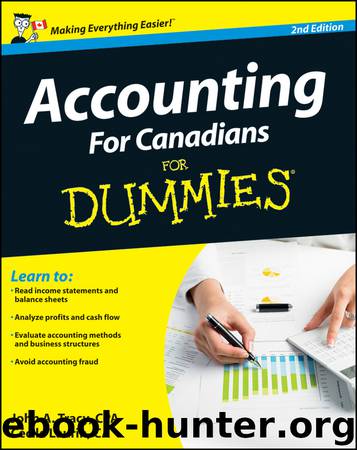Accounting For Canadians For Dummies by John A. Tracy

Author:John A. Tracy
Language: eng
Format: epub
Publisher: Wiley
Published: 2011-12-06T05:00:00+00:00
Now consider this: The main purpose of issuing additional shares is to deliberately dilute the market value per share. For example, a publicly owned corporation doubles its number of shares by issuing a two-for-one stock split. Each shareholder gets one new share for each share currently owned, without investing any additional money in the business. As you would expect, the market value of the stock drops in half — which is exactly the purpose of the split, because the lower share price is better for stock market trading (according to conventional wisdom).
Recognizing conflicts between shareholders and managers
Shareholders (including managers who own shares in the business) are primarily concerned with the business’s profit performance; the dividends they receive and the value of their shares depend on it. Managers’ jobs depend on living up to the business’s profit goals. But although shareholders and managers have the common goal of optimizing profit, they have certain inherent conflicts of interest:
The more money that managers make in wages and benefits, the less shareholders see in bottom-line net income. Shareholders obviously want the best managers for the job, but they don’t want to pay any more than they have to. In many corporations, top-level managers, for all practical purposes, set their own salaries and compensation packages.
A public business corporation establishes a compensation committee consisting of outside directors that sets the salaries, incentive bonuses, and other forms of compensation of the top-level executives of the organization. An outside director is one who has no management position in the business and who, therefore, should be more objective and should not be beholden to the business’s chief executive. This is good in theory, but it doesn’t work out all that well in practice — mainly because the top-level executive of a large public business typically has the dominant voice in selecting the persons to serve on its board of directors. Being a director of a large public corporation is a prestigious position, to say nothing of the annual fees that are fairly substantial at most corporations.
The question of who should control the business — managers, who are hired for their competence and are intimately familiar with the business, or shareholders, who may have no experience relevant to running this business but whose money makes the business tick — can be tough to answer.
In ideal situations, the two sides respect each other’s contributions to the business and use this tension constructively. Of course, the real world is far from ideal, and in some companies, managers control the board of directors rather than the other way around.
As an investor, be aware of these issues and how they affect the return on your investment in a business. If you don’t like the way your business is run, you can sell your shares and invest your money elsewhere. (However, if the business is privately owned, possibly no ready market exists for its shares, which puts you between a rock and a hard place.)
Partnerships
Suppose you’re starting a new business with one or more other owners, but you don’t want it to be a corporation.
Download
This site does not store any files on its server. We only index and link to content provided by other sites. Please contact the content providers to delete copyright contents if any and email us, we'll remove relevant links or contents immediately.
The Brazilian Economy since the Great Financial Crisis of 20072008 by Philip Arestis Carolina Troncoso Baltar & Daniela Magalhães Prates(133693)
International Integration of the Brazilian Economy by Elias C. Grivoyannis(108454)
The Art of Coaching by Elena Aguilar(53172)
Flexible Working by Dale Gemma;(23284)
How to Stop Living Paycheck to Paycheck by Avery Breyer(19685)
The Acquirer's Multiple: How the Billionaire Contrarians of Deep Value Beat the Market by Tobias Carlisle(12307)
Thinking, Fast and Slow by Kahneman Daniel(12222)
The Radium Girls by Kate Moore(12012)
The Art of Thinking Clearly by Rolf Dobelli(10412)
Hit Refresh by Satya Nadella(9118)
The Compound Effect by Darren Hardy(8919)
Tools of Titans by Timothy Ferriss(8361)
Atomic Habits: Tiny Changes, Remarkable Results by James Clear(8318)
Turbulence by E. J. Noyes(8040)
A Court of Wings and Ruin by Sarah J. Maas(7809)
Change Your Questions, Change Your Life by Marilee Adams(7733)
Nudge - Improving Decisions about Health, Wealth, and Happiness by Thaler Sunstein(7689)
How to Be a Bawse: A Guide to Conquering Life by Lilly Singh(7464)
Win Bigly by Scott Adams(7183)
